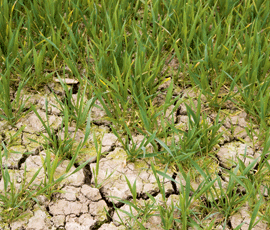Agency to review drought plan

The Environment Agency is to review its drought plans as dry weather continues to affect crops and grassland.
The move follows a drought summit between government ministers, farm leaders, water companies and agency officials on Monday (16 May).
DEFRA secretary Caroline Spelman said she wanted to make sure the country was prepared for drought conditions.
“We’re not in a drought yet, although the severity of dry conditions differs from place to place,” she said.
“I have asked the Environment Agency to report next week on the likelihood of a drought in the longer term, and how it might affect our farmers, our food industry and consumers.”
The UK has received 61% of normal rainfall over the last three months and 24% of the long-term average rainfall for April.
Provisional figures suggest both East Anglia and the midlands have had the driest October to April since 1975-76.
Soil moisture levels at the start of April were more usual for the start of June.
Water companies monitoring the situation remain confident of maintaining supplies. But Mrs Spelman cautioned against complacency.
“The Environment Agency, together with the water industry, are going to provide me with an update on water supplies and they are also going to review their drought plans.
“I have also arranged a further meeting of those who get their water from rivers to find immediate steps they can take to make that water go further – not just to deal with the current dry weather, but also to help inform longer term resilience issues for the future.”
Mrs Spelman described the actions agreed at the meeting as the first steps towards protecting the country from a potential drought.
The group would meet again next month unless there had been a change in the situation, she added.
“We should remember that we can all play our part in using our valuable water resources wisely.”
The UK Irrigation Association said low river levels were beginning to impact on farmers who relied on water abstraction to irrigate their crops.
The dry spell is having a negative effect on the development of cereals, particularly on light soils in the east of the country.
Crops elsewhere are showing signs of stress.
Dry conditions are also affecting the livestock industry in certain parts of the country where grass growth has been held back.
The NFU said many crops had the capacity to recover from periods of reduced water, depending on duration.
It remained too early to predict with any certainty what the eventual impact of this particular period of dry weather would be in terms of crop yields.

